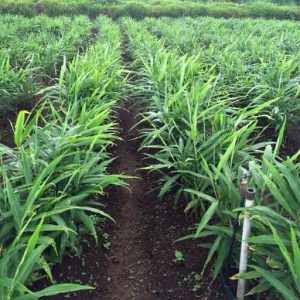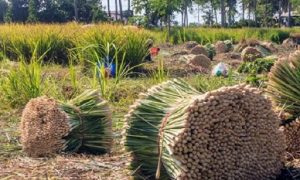AVAILABLE ON AMAZONE STORE
The ingredients in CO-DI are grown naturally in Vietnam, where all the ingredients are generously endowed by nature. Cultivated land stretches from the south to the north of Vietnam.
The ingredients in CO-DI are grown naturally in Vietnam, grown and harvested according to GAP (Good Agricultural Practice), ensuring the entire traceability of the process. We cooperate with farms, and with scientists to secure the supply of raw materials.
COCONUT
Binomial name: Cocos nucifera
Composition: containing 1-2% Oza and polyol, organic acids (malic acid), and many other amino acids: diphenyl 1-3ure [1]. Coconut water is rich in inorganic ions such as Potassium (290 mg%), Sodium (42 mg%), Calcium (44 mg%), Magnesium (10 mg%), Phosphorus (9.2 mg%),…The concentration of these electrolytes provides an osmotic pressure equal to the osmotic pressure in the blood and has no effect on coagulation [2].
Coconut water also works to detoxify trace minerals and alleviate symptoms of toxicity when drug overdose. Coconut water also helps us absorb the drug better and reach peak concentrations more easily through electrolytes, similar to the mechanism by which fructose is absorbed quickly into the body [16].
The antimicrobial activities of coconut water have medicinal uses, and are considered a good drink for cholera patients because of its saline salt and albumin; also for patients with urinary infections or diarrhea. The high concentration of potassium in coconut water has effects on cardiovascular protection [3].
High potassium concentrations in coconut water have been reported making blood pressure lowered. Antioxidant effects of the amino acid L-arginine (30 mg / dL) presenting in coconut water are effective against the generation of free radicals. In addition, in coconut water, there is Vitamin C (15 mg / 100mL), which works to reduce lipid peroxidation. The hepatoprotective activity of coconut water was demonstrated from histopathological studies of the liver, which did not show any adipose infiltration or necrosis, as observed in mice infected with CCl4 [4]
In addition to its anti-aging and anti-cancer effects, Kinetin in coconut water also has ability of anti-platelet aggregation, and may be a potential agent in arterial thrombosis treatment. Kinetin inhibits platelet aggregation, which may later prevent blood clotting [15].

We source our Coconuts from the Organic Coconut Garden in Ben Tre. Coconut farms are certified to use no chemical fertilizers, no chemical pesticides, no grazing livestock, and no fish toilet inside the garden. Dual benefit from organic coconut farming. Coconut soil is converted organically from 2-3 years to American and European organic standards.
BEN TRE becomes the capital of Vietnam with a coconut processing industry of high value-added stature in Southeast Asia, Asia.

Ben Tre is the last islet that receives alluvium of the Mekong before flowing to the sea, the favorable waters, fertile clay and mud, rich in humus, and many good antibacterial conditions create favorable conditions for coconut to grow with better yielding fruit and fruit quality than other regions.
In CO-DI we call coconut: “the fruit makes your lungs green”
GINGER
Binomial name: Zingiber officinale RoseGinger is a plant species that is often used as a spice or medicine. In ginger, there are active substances such as Zingiberen, resin, spicy substance, and starch. Furthermore, ginger also includes other substances like vitamins (B1, B2, B3, B5, B6, B9, vitamin C), minerals (potassium, magnesium, phosphorus, iron, calcium, zinc).
Chemical composition: ginger contains essential oils, oily substances, fats, starch, and spicy substances such as zingeron, zingerola and shogaols [1].
Ginger (Zingiber oficinale) is an herbal plant that has been used in traditional medicine for ages with the effect of cold dissipation, sexual physiological recovery, moisture reduction, and sputum reduction. Treatment in cold abdominal pain, distention, indigestion, vomiting, diarrhea, cold limbs, moisture, sputum, asthma, cough. Ginger is also a popular spice in everyday dishes. Ginger is one of the classic examples of herbs not only used in culinary processing but also has unique medicinal significance due to its antioxidant, antibacterial, and anti-inflammatory properties. The spicy parts of ginger specifically include gingerols, shogaols, parasols, and volatile ingredients like sesquiterpenes and monoterpenes which are believed to have health-boosting effects particularly related to anti-cancer through immune nutritional and potentials of antioxidant and cardiovascular disease treatment [5], [6] Nowadays, there are many studies in the world involving immunostimulating properties that help to protect hosts against opportunistic infections [7]. In addition, research has evaluated natural immune enhancement effects improving the body’s immune response of Ginger (Zingiber officinal), Garlic (Allium sativum), and Black Cumin (Nigella sativa) while being included in the daily diet to boost the body’s immunity [8]. Ginger has also been studied together with purple leaf wild chamomile (Echinacea Angustifolia DC) to prepare soft capsules containing the combination of E. Angustifolia DC. and Z. officinale Roscoe helping in regulating and enhancing anti-inflammatory immunity [9].

Benefits of Ginger: Vietnamese ginger is pungent and has a distinct flavor.
Ginger is commonly grown in the northern provinces (Lang Son) to the South (Ca Mau…).
LEMONGRASS
Binomial name: Cymbopogon nardus L.
According to Oriental medicine, lemongrass is also known as “Huong mao” or “Co Chanh”. Lemongrass is widely used as both medicine and spice plant. The main composition in lemongrass essential oil is citral.
Chemical composition: Essential oils mainly with Citronellal and Guardiola
Lemongrass is compared as a “treasure” of essential oils. Lemongrass leaves contain 0.4-0.8% volatile essential oils, the main component of lemongrass stem contains 75-85% natural lemon-flavored aroma and other special essences. Lemongrass roots contain 1-2% light yellow essential oils with lemon-fragrance, the main components are citral (65 – 85%), and geraniol (40%) [1].
According to Oriental medicine, lemongrass has a light aromatic warm taste and has the effect of making sweat, urinating, and consuming food. Lemongrass is mainly used to treat colds, fever, bloating, diarrhea, etc.
In addition, lemongrass is also used to kill microorganisms (pathogens) and as a mild skin firming agent. Citral compounds in lemongrass help to kill cancer cells and does not harm other healthy cells. Besides, some other studies also prove that lemongrass contains beta-carotene-1, an antioxidant that can help the body to prevent cancer. The aroma of lemongrass essential oil is mild, pleasant and has powerful antibacterial and bactericidal properties. The anti-bacterial and bactericidal properties of the lemongrass essential oil will help to inhibit the growth of bacteria and viruses, long time ago, people have discovered that periodontal diseases are infections of the periodontal, including that the inoculum by bacterias, immune responses, and tissue destruction. Lemongrass essential oil inhibits the growth of many microorganisms including periodontal disease-causing microorganisms, especially reference strains Actinomyces naeslundii and Porphyromonas gingivalis, which are already resistant to tetracycline hydrochloride [10]
It is possible to steam lemongrass essential oil in the room to increase immunity and bactericide [11]. Besides, the results of a current study show that Lemongrass possesses significant immunomodulatory activity and has the effect of preventing hematological changes in mice exposed to Cadmium [12].
Besides, lemongrass essential oil has been tested for anti-fungal activity and has many potentials as antifungal agents. Candida albicans is an opportunistic yeast and is a member of the normal human flora that often causes infections in patients with any deficiency of the immune system. [13]

Lemongrass from Tan Phu Dong, Tien Giang, Binh Phuoc, Tay Ninh…
With a large area of planting lemongrass, after taking the stem, the number of lemongrass leaves will be fully utilized to produce essential oils.

